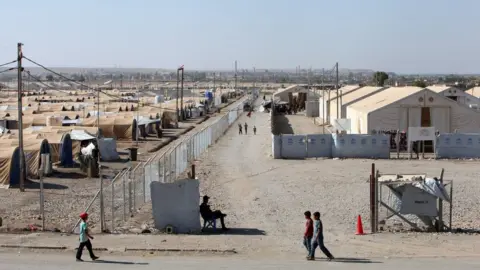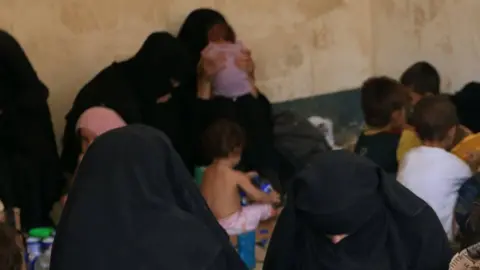Iraq holds 1,300 foreign wives and children of IS suspects
 Reuters
ReutersThe Iraqi authorities are holding more than 1,300 foreign family members of suspected Islamic State militants at a displaced people's camp south of Mosul, officials and aid workers say.
The women and children, from at least 13 countries, mostly fled Tal Afar as troops recaptured the city last month.
The Norwegian Refugee Council, which is providing assistance at the camp, said they were in "de-facto detention".
Iraqi officials said they were likely to be repatriated to their countries.
Thousands of foreigners travelled to Iraq and Syria to live in the "caliphate" proclaimed by IS after it took control of much of northern and western Iraq in 2014.
Iraqi army and intelligence officers told Reuters news agency journalists who visited the camp at Hammam al-Alil over the weekend that many of the women and children no longer had their original documents, but that most were Turkish.
Many others were from former Soviet states, such as Tajikistan, Azerbaijan and Russia, they said, adding that there were also a "very few" French and Germans.
 Reuters
ReutersOne officer said they had surrendered to Kurdish Peshmerga forces near Tal Afar along with their husbands, who were assumed to be IS militants.
The Kurds handed over the women and children to Iraqi troops, but the fate of the men was not immediately clear.
One Kurdish commander, Brig Gen Kamel Harki, told the Associated Press that some of the men had been handed over to the Iraqi authorities, while others had been killed after faking their surrender and launching attacks on their captors.
The Reuters journalists said they found hundreds of the women and children sitting on mattresses crawling with bugs in tents without air-conditioning. Many of the women were still wearing the black cloaks and face veils mandatory in IS-held areas.

A French-speaking woman of Chechen origin, who said she had lived in Paris before being brought to Iraq by her husband, was quoted as saying: "I want to go back [to France] but don't know how."
Col Ahmed al-Taie of the Iraqi military's Nineveh Operations Command said: "We are holding the [IS] families under tight security measures and waiting for government orders on how to deal with them."
"We treat them well. They are families of tough criminals who killed innocents in cold blood, but when we interrogated them we discovered that almost all of them were misled by vicious [IS] propaganda."
The Norwegian Refugee Council confirmed that more than 1,000 foreign nationals were being "held in a militarised site, with their freedom of movement restricted".
It called on the Iraqi government to "swiftly move to clarify its future plans for these individuals".
"Like all those fleeing conflict, it is imperative that these individuals are able to access protection, assistance, and information," a statement said.
"The Iraqi government must swiftly move to clarify its future plans for these individuals, while at the same time guaranteeing their fundamental rights," it added.
